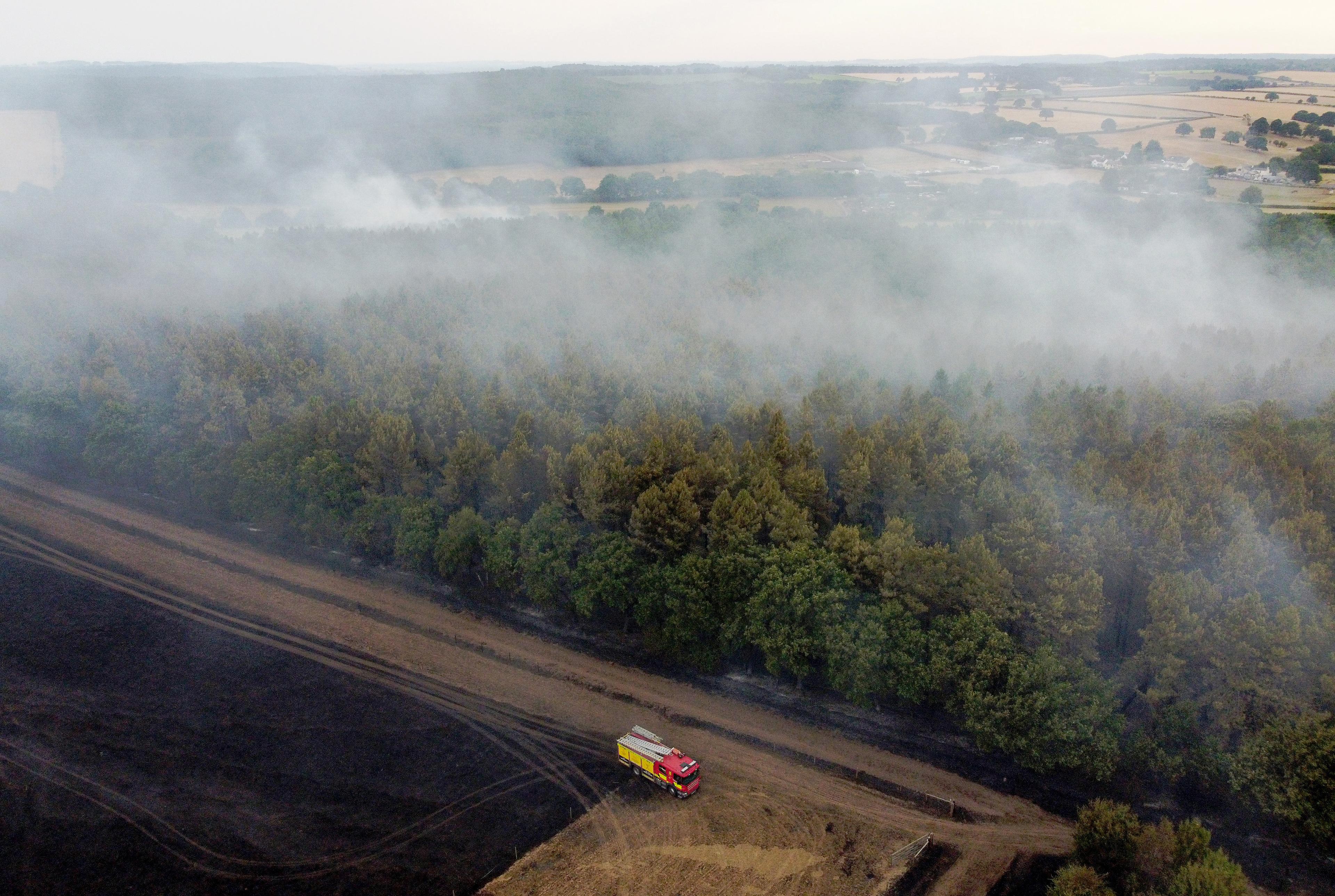
The world is on fire. In southern Europe, wildfires are streaking from Portugal to Greece. In the U.K., airport runways melted as temperatures exceeded 103 degrees for the first time on record. In the U.S. this week, about one in five Americans are living in a place that will be even hotter than the U.K.’s historic mark. And what is our government doing about it? Pretty close to nothing.
But if you look behind these headlines, there’s something very interesting happening. In the past decade, the price of solar electricity has declined by 90 percent. The efficiency of lithium-ion batteries has increased by 90 percent. Per-capita emissions in the U.S. have declined by a quarter since 2005, falling all the way to levels not seen since 1960. These are technological revolutions worth building on. But they will require that Americans get over their allergy to new construction. And build.
Today’s guest is David Wallace-Wells, a writer for The New York Times and the author of bestseller The Uninhabitable Earth. In this episode, we talk about the future of a hot world, the science of heat, the depressing state of climate policy in Washington, the more hopeful state of climate technology and global adaptation, the end of old-fashioned environmentalism, and the future of a new climate movement.
If you have questions, observations, or ideas for future episodes, email us at PlainEnglish@Spotify.com. You can find us on TikTok at www.tiktok.com/@plainenglish_.
In this excerpt, Derek and David discuss the heat waves sweeping Europe, and what it could mean for the rest of the planet.
Derek Thompson: So we have to start with these heat waves that are taking over Europe, the U.S., much of the Northern Hemisphere. I do not know enough about climates or meteorology to ask this question in a smart and sophisticated way, and so that leaves the not very smart or sophisticated way: Why is it so hot in Europe right now?
David Wallace-Wells: Well, I mean, your intuitions as a lay observer are not in any way wrong, which is to say it is crazy hot in Europe. It’s also crazy hot in China. It has been for several months now. Crazy hot in South Asia. And just to bracket that for a second, this means both China and India and Pakistan, so together almost three billion people on the planet have each experienced heat waves lasting longer than 30 days so far this year. We often think about China and India as they’re two countries, which they are, but they’re also more than a quarter of the world’s population. There’s heat waves in the U.S. right now.
And all of them are pretty extreme. Some are more extreme than others. Some are more off the charts than others. The ones in Europe are getting a lot of attention now because they are so out of the range of our expectations. And that means that they’re so much more dangerous, which is something we can talk about a little bit later. But the fact that these populations are not used to these temperatures is itself a really important thing about how bad they’re going to be. Whereas in a place like India, even if things are really hot, people on some level know how to deal with them.
So we’re dealing with some pretty unusual—in a lot of places, totally unprecedented—temperature events. Like in England, they have some kinds of records going back hundreds of years, so we know with some certainty that that island has never seen days as hot as they’ve seen this week. In William Shakespeare’s time, in Queen Elizabeth’s time, anytime this century, this is totally unprecedented, and the records are being broken by several degrees in one swoop, which in a normal climate would never happen.
Why is that happening? It’s complicated. One reason is the climate’s heating up. That’s important. It just means that when you move the bell curve of temperatures a little bit to the right, the things that show up sort of rarely are like way more extreme than the things that used to show up. But it also is happening because of some bigger transformations of the climate system, notably having to do with the circulation of the oceans, which is to say the way that the planet moves heat around itself. Those are slowing, which means that we’re seeing more and more of these, what are called heat dome events where it’s not just really hot for a period of time but it can be for an extended period of time and can produce some really extreme temperatures.
Last summer, there was one of these quite traumatically in the Pacific Northwest. But the truth is that the term can be applied to many of these events. And even this heat wave in Europe that we’re seeing this week, which is crazy. It’s melting the streets in the Tour de France, producing wildfires all across the continent, and even urban firestorms in London now.
All of that is crazy, but it actually was also really hot in Europe like a month ago. So a couple days ago they’ve been circulating on social media this fake forecast that the UK Met office, which is like the National Weather Service, put together a few years ago showing what temperatures could look like in 2050 if climate change continued unabated. And today’s temperatures are basically the same, which is scary enough. But what was really most striking to me about that was I saw the same thing happen in France like a month ago, which is to say that the French Meteorological Society had put together a forecast of what a really scary climate future in 2050 would look like—and a month ago, France was hitting those temperatures.
So we’re in a new state; extremes are more extreme and more common. But they’re also some basic changes to the way that weather happens on a planet that are going to make some of these events even more regular and intense than we might have expected without those changes.
Thompson: Right. So this is historically abnormal, but it also is at the same time, maybe a kind of new normal. We’re breaking 600-year-old records potentially, but also there are reasons to think that we’re likely to face these kind of heat domes in the U.S., in Southeast Asia, in Europe, for the foreseeable future, which is really scary. And it makes the next question, I think, pretty important, which is: What does heat do to our bodies scientifically? Is it the temperature level that’s most dangerous or important, or is it humidity, or is it something about recovery time? I feel like I read something about how the body can take a hundred degrees Fahrenheit for a little bit, but we need to recover at a lower temperature, especially at night when we’re sleeping. Help me understand the smart way to think about what kind of heat is most dangerous for a human body.
Wallace-Wells: Well, I think the way that I put it in my book was that we are physically heat engines. We are producing heat all the time and in order to survive, we need to constantly be cooling off. So the main thing that heat conditions of all of these varieties do is make it harder for us to cool off. And that can have a variety of effects on our heart rate, on our liver function, on other organs, and different people will experience it in different ways. Which is a meta point that’s important to make is that when we talk about some of these impacts, we imagine them as essentially universal and uniform. And we say like, “Well, if we hit this temperature, X-number of people will die.” But of course, humans are complicated. The way that we respond to heat is complicated.
Thompson: It’s never that simple.
Wallace-Wells: Yeah. We’re moving into danger zones, but it’s certainly not the case that when anybody walks outside everybody’s going to just drop dead. And certainly even those people who are dying in these heat waves—and the numbers are not small in Europe right now—they’re not dying from the same thing. Many of them, even most of them, are dying not of obvious heat stroke but of exacerbated underlying conditions. People who are sick with other diseases being pushed over the edge by the heat because our bodies need to be cooling off in order to operate properly.
This excerpt was lightly edited for clarity.
Host: Derek Thompson
Guest: David Wallace-Wells
Producer: Devon Manze
Subscribe: Spotify

